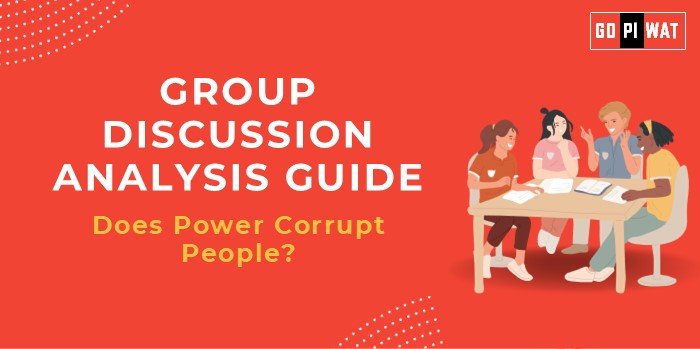📋 Group Discussion (GD) Analysis Guide: Does Power Corrupt People?
🌐 Introduction to “Does Power Corrupt People?”
Opening Context: The relationship between power and morality has long intrigued philosophers, sociologists, and political theorists, making this a relevant topic for aspiring business leaders and policymakers.
Topic Background: Originating from the adage, “Power tends to corrupt, and absolute power corrupts absolutely,” coined by Lord Acton, the concept examines how authority influences human behavior. Recent corporate and political scandals highlight its persistent relevance.
📊 Quick Facts and Key Statistics
- 📜 Lord Acton’s Quote (1887): Summarizes the philosophical debate on power and ethics.
- 📉 Global Power Scandals (2023): Over 70% of corporate fraud cases linked to misuse of authority (Source: Global Ethics Report).
- 🧠 Study on Authority and Empathy: Research from Stanford (2022) shows individuals in power scored 40% lower on empathy tests.
- 🏛️ Historical Examples: Leaders like Julius Caesar, Napoleon, and modern CEOs demonstrate diverse outcomes of wielding power.
🤝 Stakeholders and Their Roles
- 🏛️ Government: Enacts checks and balances to mitigate power abuse.
- 🏢 Corporations: Promote ethical leadership and transparency.
- 👥 Individuals: Exhibit accountability and ethical decision-making.
- 🌏 Society: Advocates for equitable distribution of power.
🏆 Achievements and Challenges
✨ Achievements:
- ✅ Ethical Leadership Models: Companies like Patagonia showcase responsible use of authority.
- ⚖️ Democratic Systems: Effective checks on power abuse (e.g., Scandinavian countries).
- 📢 Whistleblower Protections: Encourage reporting of misconduct.
⚠️ Challenges:
- ❌ Abuse of Power: Corruption scandals in both public and private sectors.
- 🧠 Psychological Impact: Power often diminishes empathy and ethical sensitivity.
- 🌏 Global Comparisons: Autocratic nations show higher instances of power misuse.
- 📚 Case Study: Enron scandal—a cautionary tale of unchecked corporate power.
💬 Structured Arguments for Discussion
- ✅ Supporting Stance: “Power reveals underlying tendencies, amplifying both corruption and integrity.”
- ❌ Opposing Stance: “Power provides a platform for ethical leadership and transformative impact.”
- ⚖️ Balanced Perspective: “While power can corrupt, robust systems can channel it for societal good.”
📖 Effective Discussion Approaches
- 💡 Opening Approaches:
- 📜 “Absolute power corrupts absolutely—an enduring challenge in governance.”
- 📊 “Stanford studies reveal power reduces empathy by 40%, raising concerns.”
- 📚 “From Julius Caesar to modern CEOs, power’s influence varies widely.”
- 📌 Counter-Argument Handling:
– Acknowledge complexity: “Power does not corrupt inherently; systems matter.”
– Provide data: Reference ethical leadership examples.
– Present solutions: Highlight checks and balances or accountability frameworks.
🔍 Strategic Analysis of Strengths and Weaknesses
SWOT Analysis:
- Strengths: Encourages leadership discussions, bridges philosophical and practical perspectives.
- Weaknesses: Risk of generalizing individual cases, challenges in defining corruption universally.
- Opportunities: Insights for governance reform, lessons for ethical business practices.
- Threats: Polarized discussions, oversimplification of nuanced arguments.
🏫 Connecting with B-School Applications
Real-World Applications:
– Ethical decision-making in leadership roles.
– Systems for power accountability.
📄 Sample Interview Questions:
- 💬 “Can power be a force for good?”
- 💡 “What systems can prevent misuse of authority?”
Insights for B-School Students:
– Reflect on personal leadership styles.
– Design frameworks for ethical accountability.


